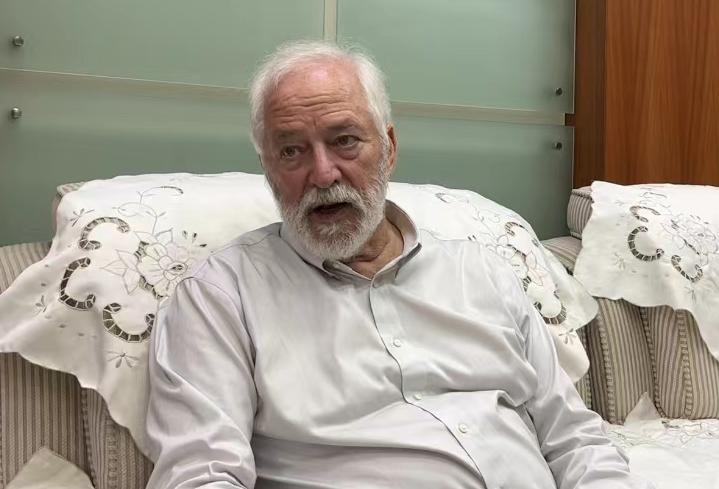
Professor Thomas Lumpkin. (PHOTO: S&T Daily)
By?BI?Weizi?&?LONG?Yun
Dr. Thomas Lumpkin, currently the Honorary Director of the International Maize and Wheat Improvement Center (CIMMYT) and professor at Washington State University (WSU), was one of the first few American students to study in China decades ago.
He has since been engaged in international agricultural research and scientific research management for over thirty years, and served as a member of the U.S.-China Relations Advisory Committee since 2000. He was bestowed with the Chinese Government Friendship Award in 2014, for his positive contributions to China's agricultural development and poverty alleviation.
International agriculture: key to a sustainable world
Raised on a small farm in eastern Washington State, Lumpkin attended elementary and high schools there and always worked on farms during his summer holidays. Then, as a young man, he served in the Peace Corps in India, where he saw firsthand challenges of not growing enough food to survive, especially without high-yield seeds and fertilizers.
"I worked with people who couldn't afford fertilizers, and the yield was about 800 kilograms per hectare," Lumpkin told the audience at his recent lecture, "Increasing Climatic Challenges to Civilization and Agriculture: Focus on China," at the Chinese Academy of Agricultural Sciences on August 11. After he decided to buy locals fertilizer, the yield increased to four tons per hectare. The people there insisted that he stay. But he realized that buying fertilizer was not the best idea.
So he went back to school, earning a BSc in Agronomy from WSU, and MSc and PhD degrees in Agronomy from the University of Hawaii. He conducted part of his doctoral research in China.
"China is different. I came to study green manure, which is a specific crop grown with the purpose of being dug into the soil while still green. This acts as a ground cover, maintaining soil structure with their root system, preventing erosion and leaching of nutrients, suppressing weed growth, and also enriching the soil with nitrogen," said Lumpkin, adding that he then took this environmentally friendly and sustainable method of planting to India, so that disadvantaged people there would not have to buy fertilizer while still having enough food to feed themselves.
His visit to China not only provided him with a great opportunity to make lifelong friends in the country, but also laid the groundwork for his subsequent academic collaboration with the country. After earning his PhD, he returned to WSU to teach agronomy, focusing on East Asian alternative crops and dedicating himself to his goal of fighting malnutrition around the world.
In 2017, Lumpkin was honored with WSU's Alumni Achievement Award, the highest honor bestowed by the WSU Alumni Association. After 20 years as a professor at WSU, Lumpkin left to become director general of the World Vegetable Center. In 2008, he became director general of CIMMYT, a nonprofit research for development organization that develops improved wheat and maize varieties to contribute to food security and innovates agricultural practices to increase production, prevent plant diseases and improve the livelihoods of smallholder farmers.
China and CIMMYT have been collaborating on wheat improvement for more than 40 years, and made significant progress. Genomic approaches have been used to develop and validate gene-specific markers, leading to the establishment of a KASP platform, and seven cultivars have been released through using molecular marker technology. A methodology for breeding adult plant resistance to yellow rust, leaf rust and powdery mildew based on the pleiotropic effect of minor genes was established, resulting in the release of six cultivars.
Climate change must be actively addressed
As the world works hard to improve the economy and livelihoods of its people, this process is taking its toll on Earth. The negative effects of food production on climate change are being felt across political boundaries.
"We have entered an era of growing food and environmental insecurity that threatens global civilization and biodiversity," Lumpkin said at the lecture, noting that the main causes are the emission of greenhouse gas, the inflation of food, fuel and fertilizer prices, as well as increasing famines and wars. Lumpkin used the metaphor of the boiling frog to illustrate people's inability or unwillingness to respond to the dire threats that climate change is beginning to pose.
But "China is responding," said Lumpkin, adding that China is also investing heavily in developing production technologies to enable efficient agriculture. He called on all countries, especially the big ones, to work together on the pressing issue of climate change.
"We are all in this together. We sink or we swim. We survive or we die together," said Lumpkin, adding that we have to look to the future and address environmental and nutritional challenges to make a sustainable, better world for future generations.
This article is also contributed by Chinese Academy of Agricultural Sciences.
The trio will conduct a series of experiments in fields such as life science, fluid physics, combustion science and materials science. Notably, this is the first time that fruit flies have been taken on a Chinese space mission as experimental subjects. What made scientists choose fruit flies? What experiment will they undergo?
